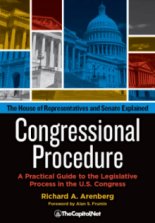Nonbudgetary / Non-Budgetary (CongressionalGlossary.com)
From the Congressional Glossary – Including Legislative and Budget Terms Nonbudgetary A term used to refer to transactions of the government that do not belong within the budget. Nonbudgetary transactions (such as deposit funds, direct loan and loan guarantee financing accounts, and seigniorage) do not belong in the budget because they do not represent net … Read more



